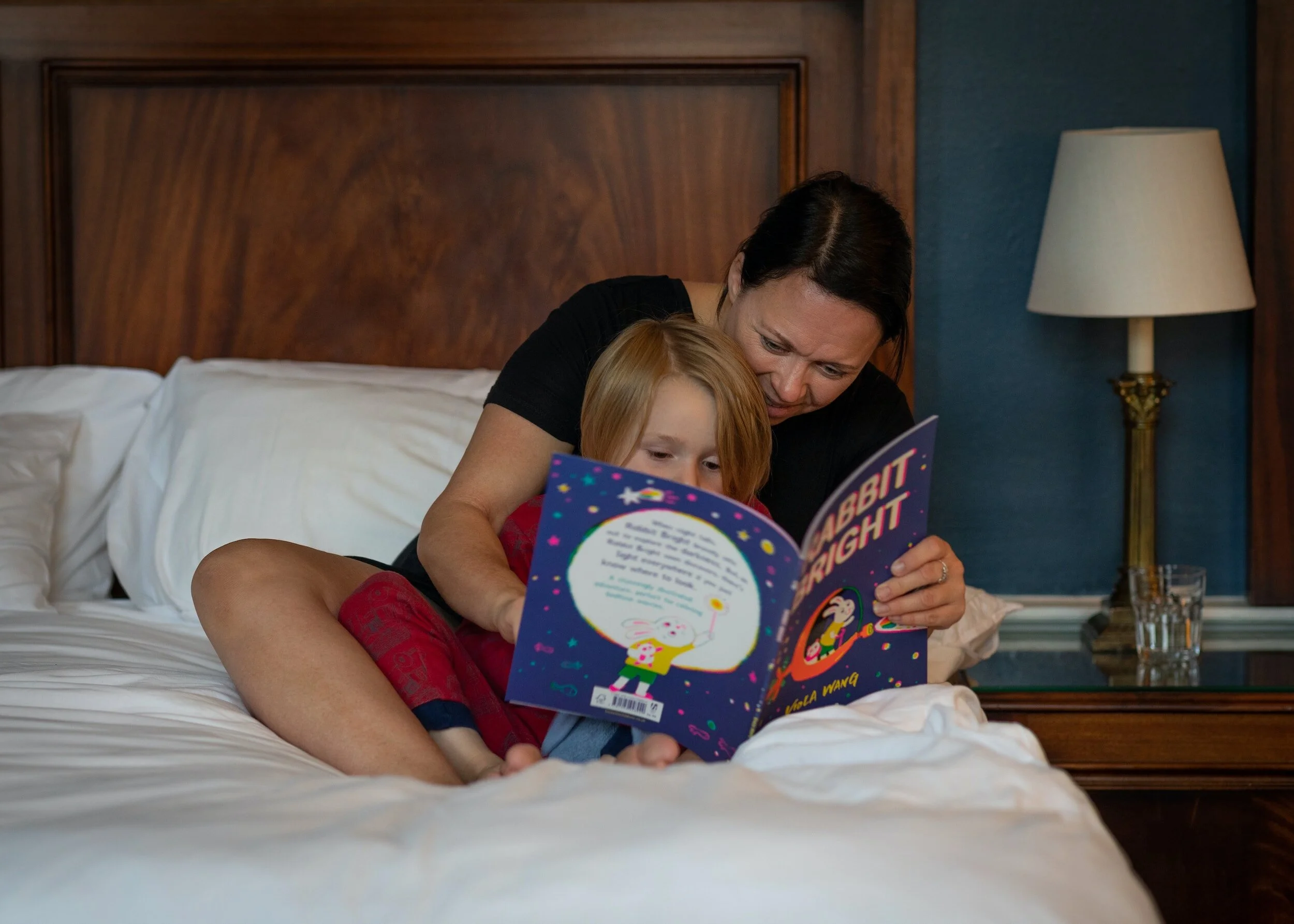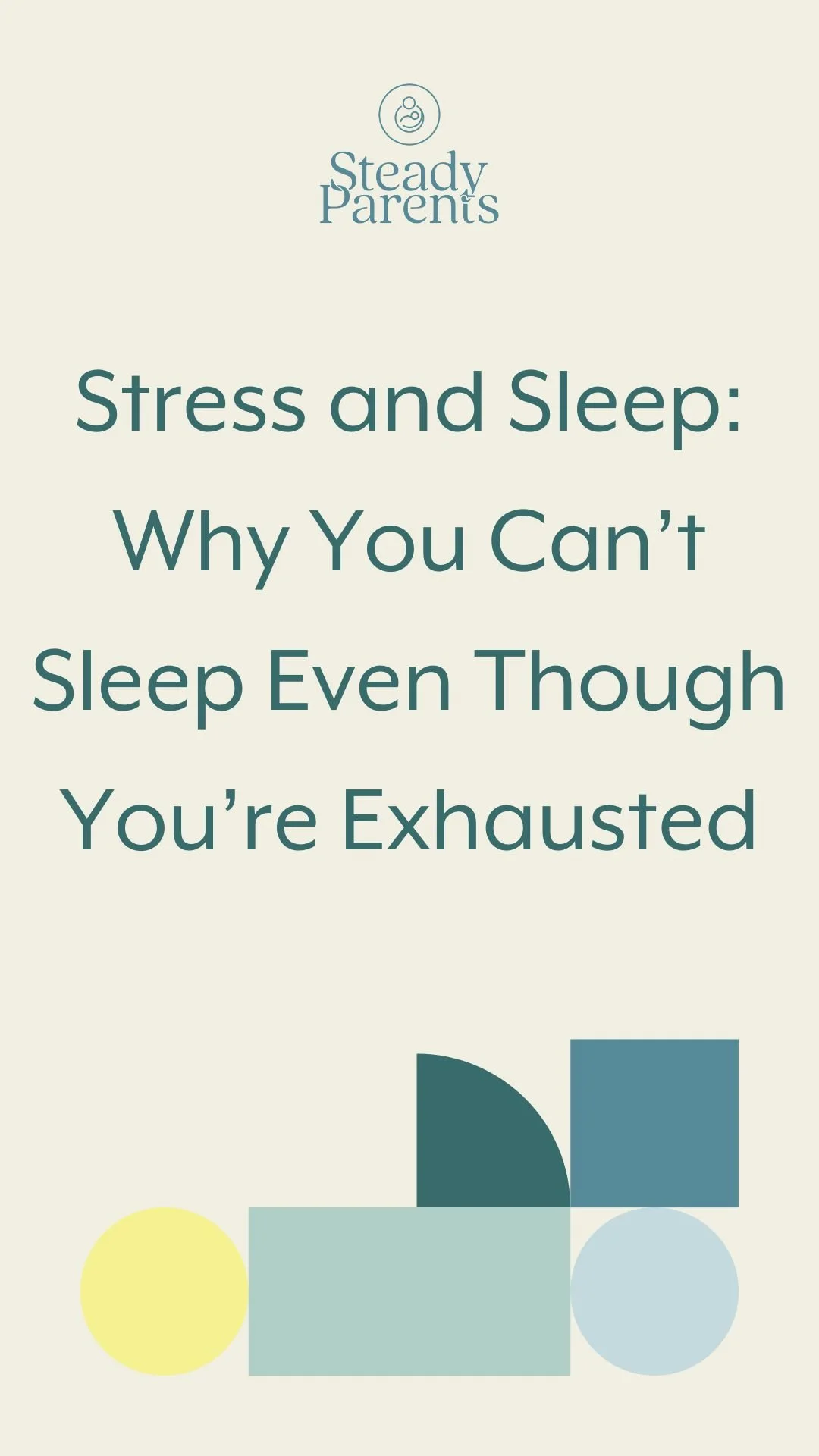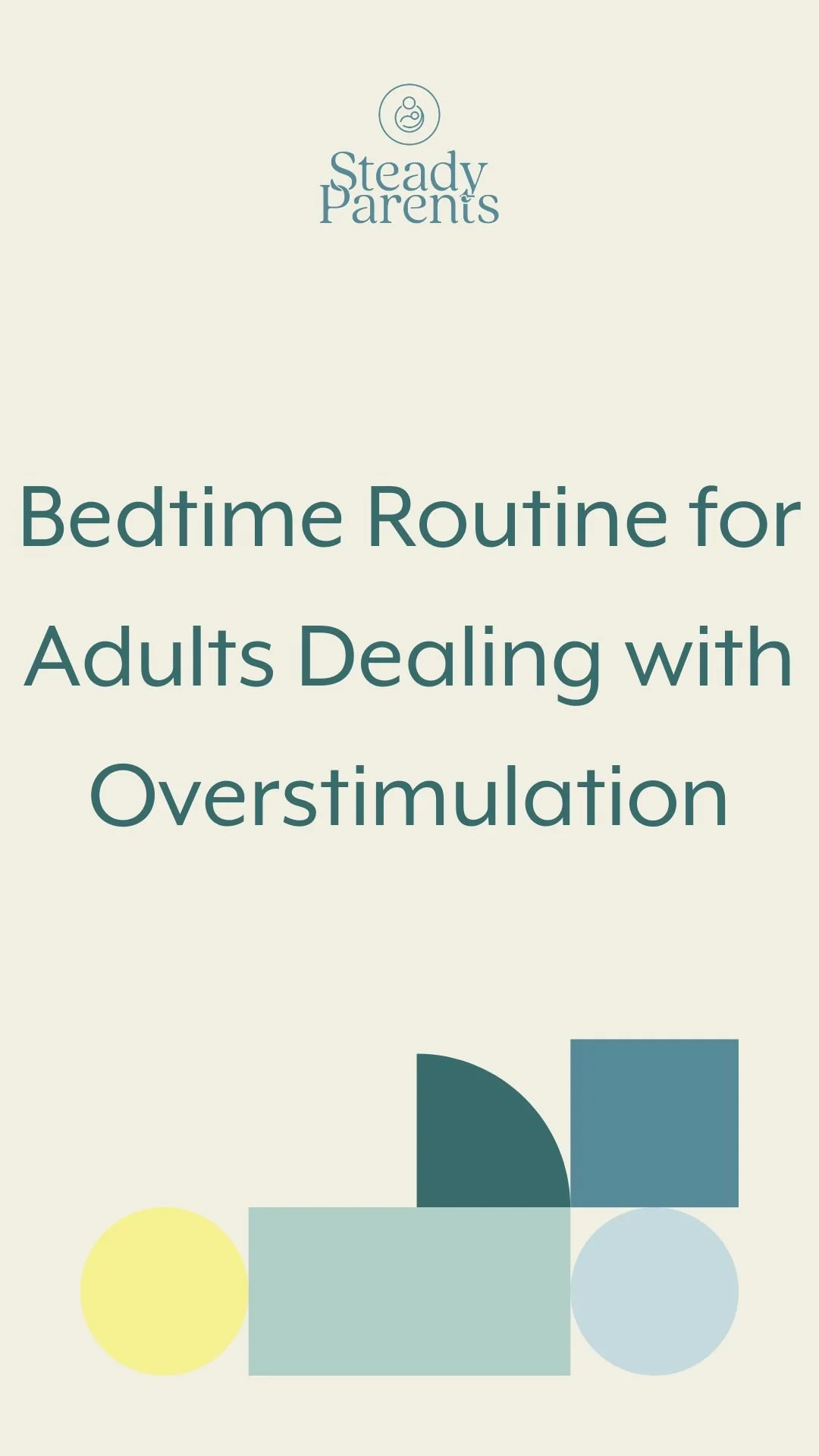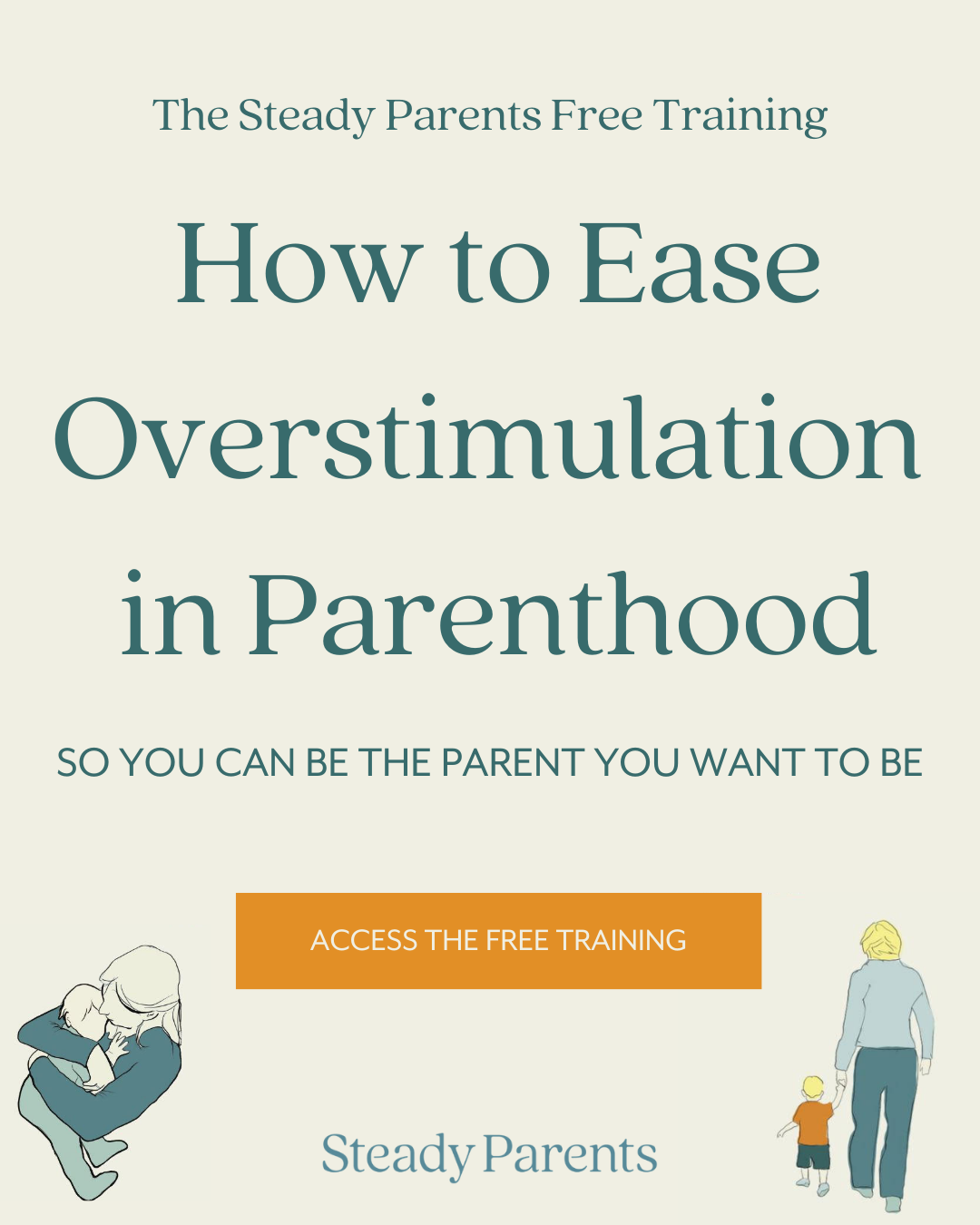Stress and Sleep: Why You Can’t Sleep Even Though You’re Exhausted
What Sleep Deprived Parents Need to Know About Stress and Sleep
As parents, we dream desperately about the day our children finally sleep through the night, only to discover that we no longer can sleep through the night.
Maybe you experienced postpartum insomnia, because you were constantly worried about missing your babies cries in the middle of the night if you fell asleep.
And the anxiety about knowing we won’t be able to sleep only makes it worse.
And the anxiety about the anxiety about not sleeping? Double whammy of sleep deprivation.
And the overstimulation that comes the following day because we haven’t slept well? Triple whammy.
Continue reading to learn more about why you can’t fall asleep at night even after your kids are sleeping through the night.
What does being tired and sleep-deprived have to do with overstimulation?
To put it bluntly, everything. Sleep deprivation has everything to do with overstimulation. They are so closely related, that it's impossible to support one without the other.
Sleep is a transition of your nervous system from one state (awake) to another (asleep). And even within sleep, there are transitions of your nervous system state, as you transition between light sleep, deep sleep, and REM sleep.
Stages of Sleep
Let’s review the five stages of sleep, beginning with Awake and transitioning to non-REM (rapid eye movement) sleep then REM sleep.
Stage 1: Awake/Alert
If you are fully awake your eyes will likely be open and the beta waves in your brain are the most dominant. As you become more drowsy, your eyes will start to close and alpha waves will become more predominate. This typically occurs in the first 5-10 minutes of preparing for sleep.
Stage 2: Light Sleep
This is the first stage of non-rem sleep and lasts about 5 minutes. Your breathing rate is consistent with your awake breathing rate. This accounts for about 5% of total sleep time.
Stage 3: Deeper Sleep
According to the NIH, “Stage 2 sleep lasts around 25 minutes in the first cycle and lengthens with each successive cycle, eventually consisting of about 45% of total sleep.” Your body temperature and heart rate begin to decrease and your brain begins to create memories from the previous day.
Stage 4: Deepest Non-REM Sleep
Considered the deepest level of sleep, in this phase your body is difficult to arouse, even when loud noises are present. If you wake up in this stage, you will likely feel disoriented and foggy. In this stage your body repairs tissue, builds muscle, and strengthens your immune system.
Stage 5: REM Sleep
In this stage, your muscles are inactive, except for your eyes and diaphragm to allow for breathing, though irregular. You will likely enter this stage of sleep about 90 minutes after falling asleep. The first REM cycle will last about 10 minutes and progressively increase throughout the night (as long as you aren’t woken up).
So how do the stages of sleep relate to overstimulation?
“An overstimulated nervous system is stuck in a highly alert, activated state. So when you are overstimulated, it can be really hard to shift into a less-active nervous system state, to both fall asleep and stay asleep. ”
And, we know from research that sleep quality is directly related to pain tolerance and sensory sensitivity. If you aren’t getting enough sleep, or you’re getting poor quality sleep, you’re going to be more sensitive to pain, noise, touch, all of it the following day.
And then because you’ll be so highly overstimulated, you’ll have a harder time falling or staying asleep the following night.
Not to mention the mental, cognitive, & physical effects of sleep deprivation, of which there are many!
Worsening depression and anxiety, poor attention & impaired judgment, and increased risk of hypertension, diabetes, obesity, heart attack, and stroke to name a few.
It can feel like a vicious cycle, but it’s not an impossible one to break out of.
What do I do if I’m overstimulated and can’t sleep?
One of the most important mindset shifts we can have when we’re dealing with sleep is that sleep is a transition.
If you’re feeling stressed right before it’s time for bed, you’re going to have a harder time falling asleep.
We are so intentional about getting the bedtime routine just right for our kids to help them fall asleep. But then we go from overstimulated hyperdrive working and thinking and cleaning and scrolling to laying in bed, wondering why we can’t sleep.
Blue light is not our friend before bedtime, folks!
Just like anything else in our day, the shift from wakefulness to sleep is a transition.
We can’t expect that we can go from fully overstimulated and awake to fully relaxed and asleep without doing anything to support that transition.
Bedtime Routine for Adults
Here’s a few tips on how to establish a better bedtime routine to help reduce overstimulation so you can fall asleep faster and stay asleep longer, reaching that beautiful deep sleep you’ve been yearning for all day.
Sensory Armor Strategies (before bedtime)
MOVE YOUR BODY
You’re about to read something that feels really counterintuitive - we’re all understimulated.
Yes, of course we are overstimulated in terms of noise, touch, cognitive load…but in terms of actual grounding into our body, we’re understimulated. We often haven’t moved our bodies in a way that feels good. This can make us feel groggy and sluggish.
We are constantly jumping from that understimulated zone to overstimulated zone, spending very little time in your “sweet spot” of sensory regulation. Our bodies are made to move.
Movement-based sensory strategies (walk, dance, bike, stretch, wiggle) are some of the most impactful ways to reduce overstimulation, and keep us in the sensory sweet spot so we can successfully transition into sleep.
SOCIAL CONNECTION
Spending time in a safe, secure, enjoyable relationship is one of the most impactful things we can do to support our sleep.
Our nervous system uses another’s nervous system to regulate (this is that co-regulation everyone talks about!), and having moments of safety with another person helps shift us into our sensory sweet spot.
This can feel hard when you’re isolated working from home, don’t have enjoyable co-workers, or you're a stay at home parent.
(This is partly why we can get that rush to connect with our partner before bed. When we start dumping every thought we ever had on our partner, and acting kind of silly. It's our body’s last ditch effort, saying “I need some safe connection before I can fall asleep!”)
A few simple strategies you might try:
-a (phone free) after school walk with your kids, before the dinner to bedtime frenzy.
-looking at pictures of a time when you felt really connected & fulfilled and bring those memories to the forefront of your mind (like a vacation, a date night, or an evening with a friend)
-running your errands with a friend who also needs to grocery shop
-setting aside intentional time to connect with your partner after the kids go to bed (just a few phone-free minutes)
Sensory Overload Support (SOS) strategies (at bedtime)
Create a bedtime routine, and stick to it - Do the same things in the same order, every time. This allows your nervous system to relax because it knows what to expect.
Consistency gives an opportunity for the parasympathetic nervous system, the one responsible for relaxation response, to take over, which can lend itself toward falling asleep.
WEIGHTED BLANKET
A weighted blanket gives consistent deep pressure into your body, which increases serotonin levels (which increase melatonin levels!), and can help you fall, and stay asleep.
I recommend the Luna blankets, they’re beautiful, cooling, washable, and affordable. (affiliate link) Use code LARISSA for 10% off.
SELF-COMPASSION
Sitting in bed upset with yourself for whatever you did “wrong” today doesn’t help you fall asleep. In fact, self-criticism takes away from your sense of felt safety, which keeps you in a high arousal state, so you can’t easily transition into low arousal for sleep.
This might look like:
“It’s really hard to get into bed when I don’t have any time to myself/there’s so much to do. It makes sense that I didn’t.”
“Right now in this season I may not be able to get enough sleep, but I can show myself compassion for these moments even when I can’t fix them.”
Sleep is really hard, especially for overstimulated parents.
But, it’s not an impossible situation. If you support the transition to sleep with intention and compassion, you’ll be fast asleep soon, and wake up refreshed and ready to tackle the overstimulating parts of parenthood with joy instead of panic.
PIN THIS FOR LATER:









